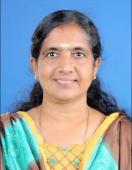Vanaja T, Dr.

Mobile Phone No:
9495240048
Email ID:
Address (Residence):
India
| Position(s) | Email ID | Phone No |
|---|---|---|
| Associate Director of Research, Regional Agricultural Research Station, Pilicode | adrpil@kau.in | 9495240048 |
Bio-data:
| Attachment | Size |
|---|---|
| 710.78 KB |
Profile:
| Name | : | Dr. Vanaja. T |
| Designation | : | Profesor and Associate director of Research (North zone), KAU and Head, RARS, Pilicode |
| Residential address | : | Vanajyotsana (H), Echilamvayal, P. O. Vellur, Payyanur, Kannur 670307 |
| Date of joining KAU | : | 19/06/1999 |
| Qualification | : | Doctorate in Plant Breeding and Genetics |
| Area of specialization | : | Plant breeding and variety development |
| Publications (number only) | ||
|
Journal publications: 42 In conference proceedings: 18 |
Popular article: 64 | Books/Chapters in book: 10/12 |
| Projects (numbers only) | Ongoing: 3 | Completed: 12 |
| Expertise for consultancy | : | Organic Plant Breeding (OPB and PPB), Rice variety development and organic agriculture with special emphasis to rice |
പ്രധാന വെബ്സൈറ്റുകള്
മേല്വിലാസം
കേരള കാര്ഷിക സര്വകലാശാല
കെ.എ.യു. മുഖ്യ കാമ്പസ്
കെ.എ.യു. (പി.ഓ.), വെള്ളാനിക്കര
തൃശൂര് 680656
:+91-487-2438011
:+91-487-2370019




